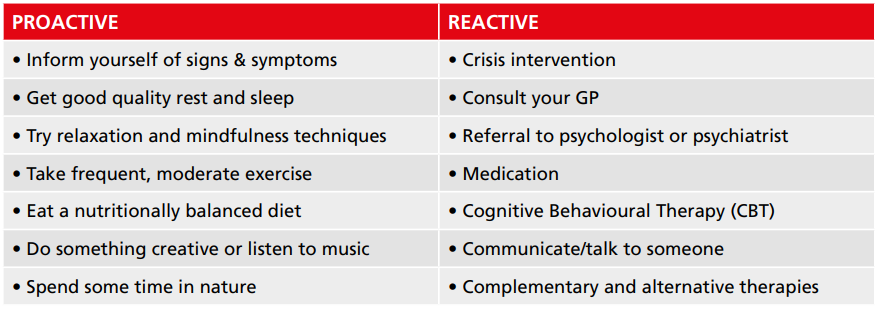Annual Themes 2022: Q4 Mental Health Awareness
The focus of the Q4 safety theme in 2022 will be Mental Health Awareness
Mental Health Awareness - Individuals
As an individual you have a duty of care to yourself. By using self-care techniques and making a few lifestyle tweaks you can make significant changes to your mental health. Although poor mental health cannot be prevented, and there may be times when you require professional medical support, there are many proactive things that you can do to help yourself.
Consider that we are all on the mental health continuum, where we are on it can fluctuate on a weekly, daily or even hourly basis for example, at the beginning of a stressful day you may be anxious with anticipation, but later that day you may feel a lot better because the situation has passed, and you have successfully come through the day. We also all react differently to interventions and treatments, but here are a few suggestions.

Our ever-changing state is normal and it’s good to recognise how you are feeling and that it is temporary. However, it is also important to be able to identify when you see a trend in poor mood, or when things that usually make you happy are not having the same effect.
There is a lot of excellent advice out there for maintaining both physical and mental wellbeing but unfortunately not a lot of it directly applies specifically to energy workers. The key is to work with what you have, and only trying to control the things you can. Yes, you may be resilient by nature, but they are not immune.
Mental and physical health are inextricably linked and each one has an effect on the other. Poor mental health tends to lead to unhealthy habits, coping mechanisms such as smoking, drinking more alcohol, and unhealthy eating habits. Lack of motivation can also lead to people not having the energy, to take less exercise, and adopt a more sedentary lifestyle. This in turn takes a toll on physical health and increases heart risk factors, which again creates this vicious cycle, further affecting our mental health - so we need to look at how we break the cycle. A holistic approach to maintaining good mental health and resilience is one where you don’t just look after your mind, but other factors which can impact your mood, like your physical health and interactions with others.
Rather than waiting to treat signs or symptoms of poor mental health it can be beneficial to put in place proactive measures which become part of your daily routine. For example, some people find physical stretching exercises each morning help then to warm up for the day, similarly some people find that mindfulness exercises can prepare their mind for the day ahead or a good night’s sleep.

The focus of the Q4 safety theme in 2022 will be Mental Health Awareness
Mental Health Awareness - Employers
Mental Health Awareness - Friends
During the first quarter of 2022, the focus will be on Process Safety Fundamentals
The second quarter of 2022 will see attention focus on Human Factors and Performance
Be the first to receive our news and alerts by signing up to join the Step Change in Safety website